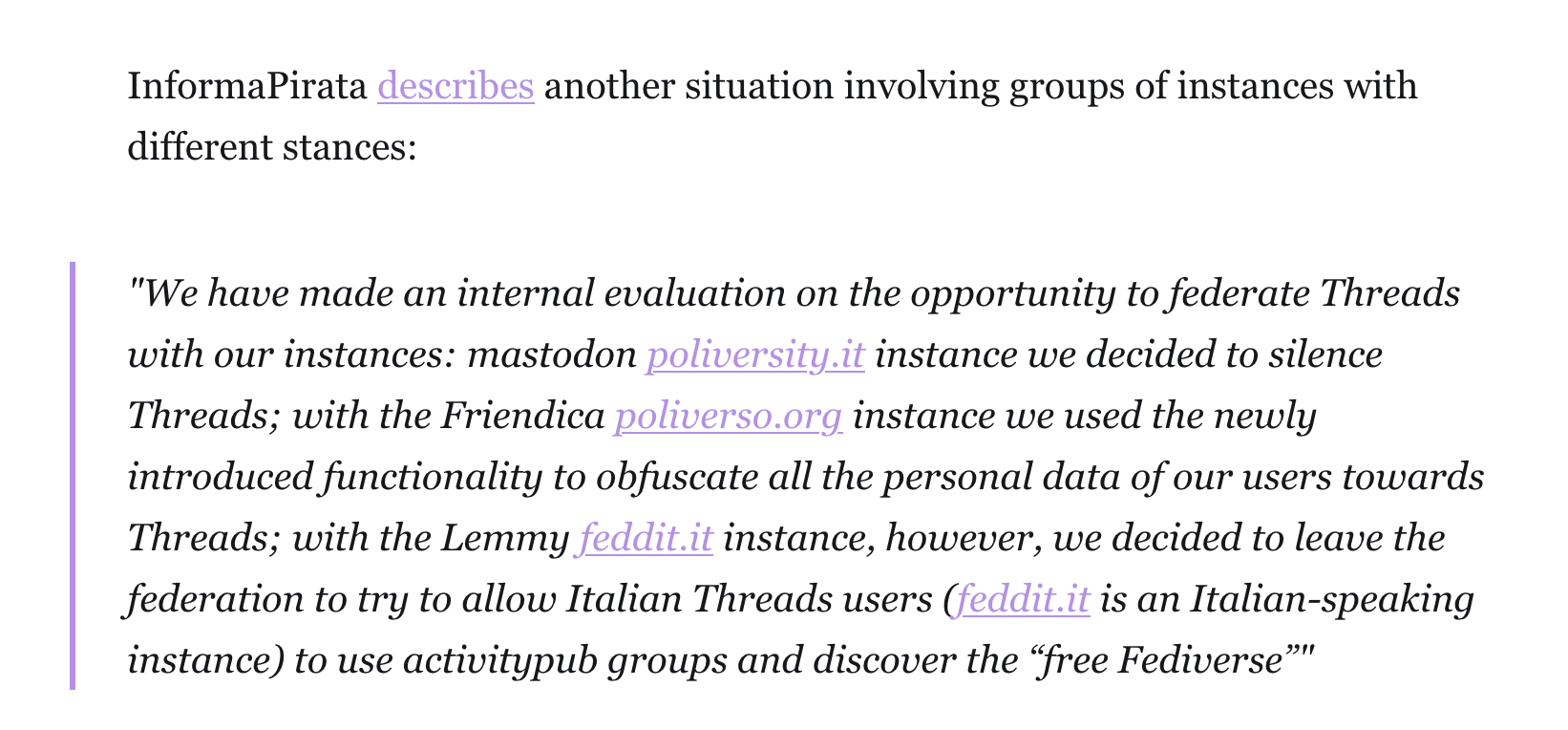The Nexus Of Privacy looks at the connections between technology, policy, strategy, and justice.
To get feedback! I often send out drafts to newsletter subscribers and post them on Mastodon and in the [email protected] community ... I got a lot of good feedback on this one which is incorporated in the revised version.
Fork it! It's time for a Mastodon hard fork
An opportunity to improve safety, the Mastodon ecosystem, and fediverse software development

It's time for a hard fork of Mastodon (DRAFT)
An opportunity to improve safety, the Mastodon ecosystem, and fediverse software development

This is a work in progress, so feedback very welcome! And, if please check out the Mastodon poll about interest in a fork
Contents:
- Intro
- There's a lot of low-hanging fruit
- Safety is an especially good area to focus on
- It's not as easy as it sounds ...
- But it's not like it defies the laws of physics!
- What about funding?
- Make sure there are funded leadership and project roles for Black, Indigenous, Muslim, trans, queer, and disabled people as well as others who have been marginalized in Mastodon's development history
- Let a thousand forks bloom!
- Clever conclusion! tbd
As the tbd in that last bullet implies, the conclusion isn't written yet. Like I said it really is a work in progress!
Thanks for the tipoff on having to turn off the VPN, it's not at all intentional -- and it's not a good look for a site with privacy in its name! I'll try to figure out what's going on, it's pretty vanilla Ghost / nginx hosted on a Digital Ocean droplet so not immediately obvious.
And yeah, it'll be interesting to see how well the messaging you for approval works out in practice. As you could say it could look like phishing; and even if it's fine when just one app is doing it, it'll be annoying if there are hundreds. Also, there's a Mastodon setting to silently ignore DMs (and I think other platforms have similar options as well). And for Bridgy Fed, it would be great to have a mechanism that works symmetrically between the fediverse and Bluesky ... but Bluesky doesn't have DMs. Tricky!
I should probably mention something about being a good ally in that section, that's a good suggestion. That's not the main message I'm trying to convey though, I really do mean it as a warning to cis guys to be careful. These firestorms are tiresome for everybody, ould we please just not? Also btw sometimes particularly unpleasant for whoever sets them off. But maybe there's a better way to word it.
Thanks, glad you think they're reasonable. I don't see it as using ActivitiyPub implying consent; it's more that ActivityPub doesn't provide any mechanisms to enforce consent. So mechanisms like domain blocking, "authorized fetch", and local-only posts are all built on top of ActivityPub. I agree that many people want something different than ActivityPub currently provides, it'll be interesting to see how much the protocol evolves, how far people can go with the approach of building on top of the protocol, or whether there's shift over time to a different protocol which has more to say about safety, security, privacy, and consent.
Thanks for the feedback -- and thanks for reading them despite the bristling. I couldn't come up with a better way to put them ... I know they'll cause some people to tune out, but oh well, what can you do.
I don't think these solutions are inherently unscalable, it's more that there hasn't ever been a lot of effort put into figuring out how to make things scalable so we don't have any great suggestions yet. I wrote about this some in The free fediverses should focus on consent (including consent-based federation), privacy, and safety (the article is focused on instances that don't federate with Threads, but much of it including this section is true more generally):
There aren't yet a lot of good tools to make consent-based federation convenient scalable, but that's starting to change. Instance catalogs like The Bad Space and Fediseer, and emerging projects like the FIRES recommendation system. FSEP's design for an"approve followers" tool, could also easily be adapted for approving federation requests. ActivityPub spec co-author Erin Shepherd's suggestion of "letters of introduction", or something along the lines of the IndieWeb Vouch protocol, could also work well at the federation level. Db0's Can we improve the Fediverse Allow-List Model? and the the "fedifams" and caracoles I discuss in The free fediverses should support concentric federations of instances could help with scalability and making it easier for new instances to plug into a consent-based network.
(The post itself has links for most of these.)
An opportunity? A minefield? Both!

If you're a developer working on a fediverse app or service and want to get it right – or just don't want to be the center of the next firestorm – here are a few suggestions.
An opportunity? A minefield? Both!

If you're a developer working on a fediverse app or service and want to get it right – or just don't want to be the center of the next firestorm – here are a few suggestions.
Preemption is bonkers from a privacy perspective, and also flies in the face of the basic principle that the states are "the laboratories of democracy." But from a corporate perspective preemption is wonderful ... it keeps pesky pro-privacy states like California and Washington from ever raising the bar above whatever can get through Congress! So historically privacy advocates and organizations have always opposed preemptive federal legislation. But that wall cracked in 2022, where EPIC Privacy joined pro-industry privacy orgs like Future of Privacy Forum to support a preemptive bill (although EFF and ACLU continued to oppose the preemptive aspects).
The argument for supporting a preemptive bill (not that I agree with it, I'm just relaying it) is that the federal bill is stronger than state privacy bills (California unsurprisingly disagreed), and many states won't pass any privacy bill. Industry hates preemption, industry hates the idea of a private right of action where people can sue companies, most Republicans and corporate Democrats will do what industry wants, so the only way to pass a bill is to include at most one of those. So the only way to get that level of privacy protection for everybody is for people in California, Maine, Illinois, etc, to give up some of their existing protection, and for people in Washington etc to give up the chance of passing stronger consumer privacy laws in the future. California of course didn't like that (neither did other states but California has a lot of votes in Congress), and Cantwell's staffers also told us in Washington that she was opposed to any preemptive bill, so things deadlocked in 2022.
With this bill, I'm not sure why Cantwell's position has changed -- we're trying to set up a meeting with her, if we find out I'll let you know. I'm also not sure whether the changes in this bill are enough to get California on board. So, we shall see.
Expect a fierce legislative battle!

cross-posted from: https://lemmy.blahaj.zone/post/10889989
Big news in DC: a new bipartisan, bicameral proposal for a "compromise" federal privacy bill, the American Privacy Rights Act (APRA). At this point, take it all with a grain of salt; in 2022, the initial draft of the bill was promising, but it got weakened substantially by the subcommittee and then weakened further by the committee. I haven't read the discussion draft yet so don't have any strong opinions on it.
Federal privacy legislation update: the American Privacy Rights Act (APRA)
Big news in DC: a new bipartisan, bicameral proposal for a "compromise" federal privacy bill, the American Privacy Rights Act (APRA). At this point, take it all with a grain of salt; in 2022, the initial draft of the bill was promising, but it got weakened substantially by the subcommittee and then weakened further by the committee. I haven't read the discussion draft yet so don't have any strong opinions on it.
Sorry about that -- and thanks for letting me know, it was down briefly but got back on its feet fairly quickly!
Should the Fediverse welcome its new surveillance-capitalism overlords? Opinions differ! If you're one of the fediverse influencers who sees Threads arrival it as "historic" and "a glimpse of the future" ... well, you might want to skip this post.
But if you're one of the many many people on the fediverse who doesn't want to deal with Threads, read on!
How to block Threads on Mastodon
Should the Fediverse welcome its new surveillance-capitalism overlords? Opinions differ! If you're one of the fediverse influencers who sees Threads arrival it as "historic" and "a glimpse of the future" ... well, you might want to skip this post.
But if you're one of the many many people on the fediverse who doesn't want to deal with Threads, read on!
Thanks! Here's how it looks:

Great example of how there isn't any one right answer here, it's different for different instances. Can I quote this in the "What will instances do? Opinions differ!" section of https://privacy.thenexus.today/should-the-fediverse-welcome-surveillance-capitalism ?
Part 3 of "Golden opportunities for the fediverse – and whatever comes next"

There's another wave of discourse about The Bad Space on the microblogging side of the fediverse, so here's my article from a couple of months ago.
If you're familiar with Fediseer, there's some discussion of similarities and differences in Compare and contrast: Fediseer, FIRES, and The Bad Space
Agreed that there isn't one particular model that's right or wrong for everybody, and that a split is likely -- a region like today's fedi and that welcomes Threads, and a more safety-focused region (with more blocking, a more consent-based federation).
And, it gives cops another excuse to overpolice Black and brown neighborhoods.
There have been other waves, it's just that once they get shut down everybody loses interest and moves on. The PR for the one of the changes Mastodon just made was implemented in May 2023 after the Doge spam wave. And here's a June 2019 post talking about exactly the same kind of attack: "The problem we are experiencing is the spammer signing up on random open instances and sending spam remotely."
The locations of microphones used to detect gunshots have been kept hidden from police and the public. A WIRED analysis of leaked coordinates confirms arguments critics have made against the technology.

On February 15th, newly-created Fediverse accounts started posting spam messages from various instances, sending invites to a Discord server for a Japanese troll organization. This spam was widespread across the Fediverse. The posts frame ap12 from “KuronekoServer” as the culprit behind the operatio...

A really interesting look at the recent spam wave.
A very good idea! https://startrek.website/ took this approach, it'd be intersting to check in with them to see what they learned.
I had shared the draft version here a few weeks ago, and this incorporates some of the feedback -- including "This goes against everything the Fediverse stands for" 😎
Part 5 of "Golden opportunities for the fediverse -- and whatever comes next."

The good news is that there are some straightforward opportunities for significant short-term safety improvements. If fediverse funders, developers, businesses, and "influencers" start prioritizing investing in safety, the fediverse can turn what's currently a big weakness into a huge strategic advantage.
Contents:
-
It's about people, not just the software and the protocol
-
It's also about the software
-
And it's about the protocol, too
-
Threat modeling and privacy by design can play a big role here
-
Design from the margins – and fund it!
Steps towards a safer fediverse
The good news is that there are some straightforward opportunities for significant short-term safety improvements. If fediverse funders, developers, businesses, and "influencers" start prioritizing investing in safety, the fediverse can turn what's currently a big weakness into a huge strategic advantage.
Contents:
-
It's about people, not just the software and the protocol
-
It's also about the software
-
And it's about the protocol, too
-
Threat modeling and privacy by design can play a big role here
-
Design from the margins – and fund it!
It's true, but the time pressure is likely to be used to try to get a weak "compromise" bill through.
A surprise disclosure of a national security threat by the House Intelligence chair was part of an effort to block legislation that aimed to limit cops and spies from buying Americans' private data.

Detailed reporting on the sleazy tactics suveillance hawks in Congress used to sabotage this week's vote on FISA Section 702 reform. It really is a bipartisan issue: the the House Intelligence Committee's Chair Mike Turner (a Republican) and Ranking Member Jim Himes (a Democrat) worked together on this, although Himes is now trying to distance himself.
The authors of the dangerous Kids Online Safety Act (KOSA) unveiled an amended version this week, but it’s still an unconstitutional censorship bill that continues to empower state officials to target services and online content they do not like.

EFF's take on the amended version of KOSA. TL;DR summary:
> We are asking everyone reading this to oppose this latest version, and to demand that their representatives oppose it—even if you have already done so.
The authors of the dangerous Kids Online Safety Act (KOSA) unveiled an amended version this week, but it’s still an unconstitutional censorship bill that continues to empower state officials to target services and online content they do not like.

EFF's take on the amended version of KOSA. TL;DR summary:
> We are asking everyone reading this to oppose this latest version, and to demand that their representatives oppose it—even if you have already done so.
Supporters of anti-LGBTQ+ KOSA bill say they have 60 votes in the Senate (US focused)
They've unveiled a new version, with some improvements. Fight for the Future's statement (not quoted in the Washington Post, of course, which is a mouthpiece for tech) says "we are glad to see the attorney general enforcement narrowed" but also notes that "As we have said for months, the fundamental problem with KOSA is that its duty of care covers content specific aspects of content recommendation systems, and the new changes fail to address that." So it's still a bad bill.
But just because they're claiming they have the votes in the Senate, it's not a done deal yet -- and it still has to go through the House. So, if you're in the US, call your legislators! https://www.stopkosa.com/
PCLOB Report on NSA use of XKEYSCORE analysis tool
This is the just-released unclassified version of the Privacy and Civil Liberties Oversight Board's December 2020 classified report on the National Security Agency’s (NSA’s) use of XKEYSCORE, an intelligence analysis tool.
What's important is *looking like* they're trying to protect children -- even though KOSA would actually harm kids

If you're in the US, https://stopkosa.com and EFF's page make it easy to contact your Senators and ask them to oppose #KOSA.
Business is business: Snap, Microsoft, and X endorse the anti-LGBTQ+, pro-censorship KOSA bill
If you're in the US, https://stopkosa.com and EFF's page make it easy to contact your Senators and ask them to oppose #KOSA.
Yep. But, even though I didn't suggest it, I didn't explicitly say that it didn't mean global blocklists. So I clarified it, and added a footnote with more detial.
As Instance-level federation decisions reflect norms, policies, interpretations, and (sometimes) strategy discusses, opinions differ on the definition of "bad actor." So the best approach is probably going to present the admin of a new instance with a range of recommendations to choose between based on their preference. Software platforms should provide an initial vetted list (along with enough information for a new admin to do something sensible), and hosting companies and third-party recommenders should also be able provide alternatives.
Yes, at least on Lemmy. It's the icon with two boxes.
No, as the article says at the very beginning, it's that I think a big reason that fediverse isn't growing is its failure to deal with safety.
Nonsense. Instance blocklists are used across the fediverse today. They're certainly not a perfect solution but they have the advantage of actually existing. See Blocklists in the fediverse for a lot more discussion.
Fediblockhole does something along those lines for on Mastodon ... not sure if there's an equivlaent in the Lemmy world.
Politico is known for its bias, but I'd say this is a fairly accurate article -- Alfred is an outstanding reporter. But you're certainly right, this is an issue that cuts across party lines.




